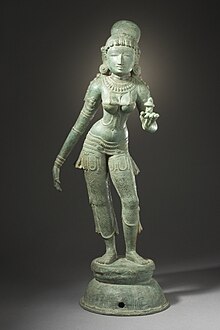
Back روكميني Arabic ৰুক্মিণী Assamese রুক্মিণী Bengali/Bangla Rukmini German રુક્મિણી Gujarati रुक्मिणी Hindi Rukmini Croatian Rukmini ID ルクミニー Japanese Rukmini JV
| Rukmini | |
|---|---|
| Member of Ashtabharya | |
 12th-13th century sculpture of Rukmini from Tamil Nadu Museum of Art | |
| Other names | Vaidarbhi, Bhaishmi, Rakhumai, Dwarikeshwari |
| Devanagari | रूक्मिणी |
| Venerated in | Warkari, Haridasa |
| Affiliation | Ashtabharya, Devi, Avatar of Lakshmi, Vaishnavism |
| Abode | Dvārakā, Pandharpur |
| Texts | Vishnu Purana, Bhagavata Purana, Mahabharata, Harivamsa, Rukminisha Vijaya, Skanda Purana |
| Festivals | Rukmini Ashtami, Rukmini Dwadashi |
| Personal information | |
| Born | |
| Died | |
| Parents |
|
| Siblings | Rukmi |
| Consort | Krishna |
| Children |
|
| Dynasty | Vrishni (by marriage) |
Rukmini (Sanskrit: रुक्मिणी, lit. 'radiant', IAST: Rukmiṇī) is a Hindu goddess and the first queen of Krishna in Dvaraka.[6][7][8] In Vaishnava tradition, she is described as Krishna's principal queen in Dvaraka, as well as the chief of his wives.[9] She is an incarnation of the goddess of prosperity, Lakshmi.[10] The goddess is regarded to be the chief or principal consort of Krishna in various pieces of literature [11][12] and is venerated primarily in Warkari and Haridasa tradition, and additionally in Sri Vaishnavism where Lakshmi-Narayana are revered and worshipped.[13][14][15][16]
Rukmini is mainly worshipped in Maharashtra and South India. The people of Maharashtra venerate her with Vithoba (a regional form of Krishna) and call her Rakhumai.[17] In South India, she is worshipped along with Krishna and his other primary consort Satyabhama.
- ^ Baburao Patel (1966). The Rosary and the Lamp.
Oh ,Sweet Rukhmai Divine Mother of Humanrace
- ^ R. D. Ranade (1994). Tukaram. State University of New York Press. ISBN 9781438416878.
"His father is pandurang and mother is rakhumai
- ^ Sunitha despande (2007). Islamic Financial Management, Volume 1 Marathi Literature. Global Vision Publishing House. ISBN 9788182202214.
Rakhumai-Mother Rukmini
- ^ A.C Bhakti vedanta swami (1968). Bhagavad Gita as it isThe Marriage of Kṛṣṇa and Rukmiṇī.
Dvārakā's citizens were overjoyed to see Kṛṣṇa, the Lord of all opulence, united with Rukmiṇī, the goddess of fortune
- ^ Kṛṣṇa Dvaipāyana Vyāsadeva (2002). TheSummumBonumŚrīmad Bhāgavatam rukmi's defeatandmarriage (PDF).
Oh King all the citizens in Dvārakā were overjoyed to see Kṛṣṇa, the Master of All Opulence joined in marriage with Rukmiṇī, the goddess of fortune
- ^ Balfour, Edward (1885). The Cyclopædia of India and of Eastern and Southern Asia: Commercial, Industrial and Scientific, Products of the Mineral, Vegetable, and Animal Kingdoms, Useful Arts and Manufactures. B. Quaritch. p. 454.
- ^ Select Specimens of the Theatre of the Hindus. Parbury, Allen. 1835. p. 83.
The marriage was solemnized at Dwarakú , and Rukmini remained the chief of Krishna's wives
- ^ Mitchell, John Murray (1885). Hinduism Past and Present: With an Account of Recent Hindu Reformers and a Brief Comparison Between Hinduism and Christianity. Religious Tract Society. p. 117.
He had eight chief wives; the queen of all, Rukmini, had been betrothed to another, but on her marriage-day Krishna carried her off in a chariot and made her his own wife.
- ^ "Rukmini, Rukmiṇī: 13 definitions". www.wisdomlib.org. 24 June 2012. Retrieved 6 August 2022.
- ^ Dasa, Gopiparanadhana (1 January 2002). Sri Brhad-bhagavatamrta: Volume One. The Bhaktivedanta Book Trust. pp. Verse 74. ISBN 978-91-7149-784-0.
- ^ Nambiar, Kunjan (12 June 2014). Krishna Charitam. Jaico Publishing House. 12.16. ISBN 978-81-8495-574-3.
And his chief consort, Rukmini fanned the guest
- ^ Bhandarkar, Ramkrishna Gopal (1987). Vaiṣṇavism, Ṡaivism and Minor Religious Systems. Asian Educational Services. p. 21. ISBN 978-81-206-0122-2.
expressed a desire for as good a son as Rukmini, his chief consort, had.
- ^ Sharma, Mahesh B. (18 May 2006). Wisdom from the Ages: Selections from Hindu Scriptures. AuthorHouse. p. 20. ISBN 978-1-4670-7917-4.
The Lord's principal consort, Shri Rukmini
- ^ Books 8-12: Krishna, spirit of delight. Vighneswara Publishing House. 1976. p. 740.
Rukmini : Chief consort of Krishna
- ^ Gosvāmī, Sanātana (2002). Śrī Br̥had Bhāgavatāmr̥ta of Śrīla Sanātana Gosvāmī : translated from the original Sanskrit, with a summary of the author's Dig-darśinī commentary. Internet Archive. Los Angeles : Bhaktivedanta Book Trust. p. 240. ISBN 978-0-89213-348-2.
- ^ Murdoch, John (1904). The Religious Sects of the Hindus. Christian Literature Society for India. p. 21.
- ^ Bryant, Edwin Francis (2007). Krishna: A Sourcebook. Oxford University Press. ISBN 978-0-19-803400-1.
© MMXXIII Rich X Search. We shall prevail. All rights reserved. Rich X Search